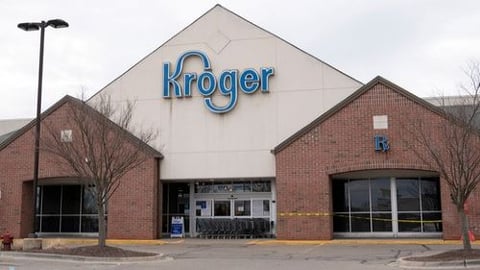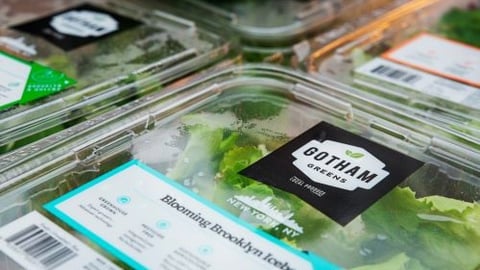Kroger’s Record FY22 Punctuated by Strong Digital, Own-Brand Performance
The Kroger Co. is building upon record fiscal years in 2020 and 2021 with an impressive set of earnings for the fourth quarter, ended Jan. 28, and full year of fiscal 2022. The grocer expects to bring that momentum into 2023 and deliver revenue and EPS growth on top of these record results.
Kroger’s Q4 saw identical sales without fuel increase 6.2%, while total company sales were $34.8 billion, compared to $33.0 billion for the same period in 2021. Gross margin was 21.8% of sales and operating profit totaled $826 million. The grocer’s private label identical sales increased 10.1% and its digital sales grew 12%.
[Read more: "Kroger Accelerates Digital Strategy With Restaurant Delivery Platform"]
"We appreciate our associates for remaining customer-focused, delivering the products customers want, when and how they want them, with zero compromise on quality, convenience and selection,” said CEO Rodney McMullen. “Our associates enable our success, and we are committed to investing in theirs by continuing to improve wages, comprehensive benefits and career development opportunities.”
Continued McMullen: “Providing affordable food is even more essential at a time when inflation is affecting so many of our customers' lives. We do this by delivering fresh products at a great value, trusted Our Brands items, and personalized promotions.”
The grocer’s Q4 brought a year-over-year decrease in its operating, general and administrative rate to 56 basis points, excluding fuel and adjustment items, which was driven by sales leverage, execution of cost savings initiatives and the cycling of several one-time expenses. Additional fourth quarter highlights include a 22% increase in delivery sales over last year, a new Kroger Delivery Customer Fulfillment Center in the Denver Metro area, and an increase in digitally engaged households by approximately 900,000, compared to the same period last year.
As for its full FY22, Kroger saw a year-over-year total company sales increase of 5.2%, excluding fuel, to $148.3 billion, compared to $137.9 billion in 2021. Gross margin was 21.4% of sales for 2022, and the company’s net total debt to adjusted EBITDA ratio is 1.57, compared to 1.63 one year ago. Delivered adjusted EPS growth was 15% and LIFO charge for the year was $626 million, compared to $197 million for the same period last year, driven by higher product cost inflation.
Kroger invested approximately $600 million in incremental wages in 2022, for a total of $1.9 billion in incremental investments since 2018. Honors for 2022 included a spot on Computerworld's 2023 Top 100 Best Places to Work in IT list, a 2023 Campus Forward Award for excellence in career hiring from Ripplematch and recognition as one of Newsweek's Most Responsible Companies for 2023.
"Kroger's 2022 results demonstrate the strength of our value creation model,” said CFO Gary Millerchip. “In 2023, we expect to build on this momentum and deliver revenue and EPS growth on top of the record results achieved over the past three years.”
Continued Millerchip: “We expect to grow revenue by continuing to invest in our customers through competitive pricing and personalization, fresh products and a better shopping experience. Building on our significant investments over the past four years, we will also continue to increase associate wages. We will fund these investments through product mix improvements, cost saving initiatives and growth in our alternative profit businesses."
FY23 is expected to bring identical sales without fuel of 1-2%, with underlying growth of 2.5-3.5% after adjusting for the effect of Express Scripts, as well as adjusted net earnings per diluted share of $4.45-$4.60, including an estimated benefit from the 53rd week of approximately $0.15. Anticipated adjusted FIFO operating profit is $5.0-$5.2 billion with capital expenditures totaling $3.4-$3.6 billion.
While the Federal Trade Commission (FTC) continues to review the proposed merger between Kroger and Albertsons Cos., reports emerged earlier this month that the retailers are following through on a previously announced divestiture. According to sources cited in a Reuters news article, the companies are planning to sell up to 300 stores in a move to dispel antitrust concerns. The value of the stores could exceed $1 billion.
In January, after several months of legal back and forth, Albertsons was given the green light to start paying out its previously announced $6.85-per-common-share special dividend. The $4 billion special dividend was originally slated to be paid to shareholders on Nov. 7 of last year, but it was delayed when the attorney general of the state of Washington asked the state supreme court to halt the payment during a regulatory review of the food retailer’s pending merger with Kroger.
Serving 60 million households annually nationwide through a digital shopping experience, and almost 2,800 retail food stores under a variety of banner names, Cincinnati-based Kroger is No. 4 on The PG 100, Progressive Grocer’s 2022 list of the top food and consumables retailers in North America. Boise, Idaho-based Albertsons operates more than 2,200 retail stores with 1,700-plus pharmacies, 402 associated fuel centers, 22 dedicated distribution centers and 20 manufacturing facilities in 34 states. The company is No. 9 on The PG 100.












